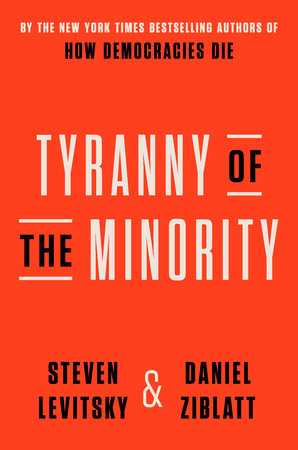The US Constitution’s Threat to American Democracy
Without serious institutional reforms, a Republican minority will continue to control the White House, the Senate and the Supreme Court. Image: Adobe
Image: Adobe
Tyranny of the Minority: Why American Democracy Reached the Breaking Point by Steven Levitsky and Daniel Ziblatt, published by Crown.
There is widespread fear that our democracy faces an existential threat. Some believe the threat is named Donald Trump. Others believe it is Joe Biden. But few see the U.S. Constitution as the biggest danger of all.
That is the argument of a brilliant, disturbing and ultimately hopeful new book by Harvard University professors of government Steven Levitsky and Daniel Ziblatt. Tyranny of the Minority: Why American Democracy Reached the Breaking Point makes a convincing case that fundamental anti-democratic institutions built into our Constitution frustrate the will of the majority and impede the creation of a thriving multiracial democracy that will serve the best interests of the American people.
“Designed in a pre-democratic era, the U.S. Constitution allows minorities to routinely thwart majorities, and sometimes even govern them,” write the authors. “Institutions that empower partisan minorities can become instruments of minority rule.”
The book demonstrates how minority rule by the Republican Party has been achieved in recent years because of several institutions: an Electoral College that allows candidates who lose the popular vote to still win the White House; a Senate with two senators from each state regardless of population; the Senate filibuster requiring a supermajority of 60 votes to pass any bill; and a Supreme Court with justices appointed for life, most recently by two Republican presidents, George W. Bush and Trump, neither of whom won the popular vote. It does not help that widespread gerrymandering in state legislatures generally favors Republicans.
This is why, between 1992 and 2020 the winner-take-all Electoral College that exists in every state except Maine and Nebraska gave Republicans a heavy small-state bias. Despite losing the popular vote in every presidential election except 2004, the Republican candidate won the presidency three times, subjecting the American people for twelve long years to a president whom a majority had voted against.
In the Senate, although Democrats have won the overall popular national vote in every six-year cycle since 1996, Republicans have controlled the Senate for most of that period. Sparsely populated states representing less than 20 percent of the U.S. population can produce a Senate majority. States representing only 11 percent of the population can produce enough votes to block legislation by use of the filibuster (a rule that appears nowhere in the Constitution). A majority of five current Supreme Court justices were appointed by Republican presidents who lost the popular vote: three by Trump and two by George W. Bush.
In the Senate, although Democrats have won the overall popular national vote in every six-year cycle since 1996, Republicans have controlled the Senate for most of that period.
The consequences of minority rule include the anti-democratic blocking of important policies and laws that most Americans support. Levitsky and Ziblatt cite surveys in 2022 that confirm that 55 percent of Americans identified as “pro-choice” while only 39 percent identified as “pro-life;” that only 37 percent approved of the Supreme Court decision to overturn Roe v. Wade; and 61 percent say abortion should be legal in all or most cases. “Despite broad majority support for abortion rights, however, counter-majoritarian institutions have thwarted the attempts of Democrats in Congress to codify Roe,” the authors argue.
Consider gun control. According to polling conducted after the 2022 mass shooting in Uvalde, Texas, 65 percent of Americans support stricter gun control laws, while only 29 percent oppose them. Yet such legislation consistently fails in the U.S. Senate, in which 20 states with the highest rates of gun ownership contain barely a third as many people as the 20 states with the lowest rates of gun ownership. Meanwhile, in state legislatures, due in large part to gerrymandering, between 1968 and 2016 there were 121 instances in which the party that received fewer votes statewide nevertheless won a majority of seats in the state house, and 146 instances in which the losing party statewide won control of state Senates. And Republicans were almost always the beneficiary.
Despite this depressing picture, Levitsky and Ziblatt do not believe all is lost. They see their book as a wake-up call and outline 15 pro-democracy reforms that they group into three categories.
The first group involves several proposed reforms relating to voting rights. These include establishing a right to vote that would provide an explicit constitutional basis to litigate anti-democratic voting restrictions; enacting automatic voter registration when a citizen turns 18; expanding early and mail-in voting; making Election Day a Sunday or national holiday; restoring voting rights to all ex-felons; restoring national-level voting rights protections struck down by the Supreme Court; reinstating federal oversight of election rules; and replacing existing partisan electoral administration with professional, nonpartisan voting officials.
The second group of reforms involve ensuring that election outcomes reflect majority preferences. They propose to accomplish this by abolishing the Electoral College and replacing it with a national popular vote; reforming the Senate so that the number of senators per state is proportionate to the population of each state; reforming the rules for elections to the House of Representatives and state legislatures to ensure proportional representation; eliminating partisan gerrymandering; and updating the size of the House so that it expands as population grows and shifts.
While these reforms may seem impossible, if we ever hope to adopt them, we must find a way to make them part of a larger national political debate.
The third and final group of reforms would empower majorities to govern by abolishing the Senate filibuster; establishing term limits (perhaps 12 or 18 years) for Supreme Court justices to ensure that every president has the same number of appointments per term; and making it easier to amend the Constitution by eliminating the requirement that three-quarters of all state legislatures ratify any proposed amendment while retaining the two-thirds supermajority requirements in both the House and Senate.
The authors readily acknowledge that these pro-democracy reforms may seem radical to us. But they note that they already exist “in the vast majority of established democracies, including highly successful ones like Denmark, Germany, Finland, New Zealand, Norway, and Sweden.” They also stress that, while these reforms may seem impossible, if we ever hope to adopt them, we must find a way to make them part of a larger national political debate. Otherwise, the entrenched powers who benefit most from these anti-democratic institutions will kill these ideas before they see the light of day.
America has overcome seemingly insurmountable challenges before. By organizing and mobilizing millions of people to make America a more perfect union, we abolished the institution of slavery, defeated white supremacist secession, and adopted the pro-democracy Civil War amendments to the Constitution. Although much work remains to be done, we mounted an inspiring civil rights movement, took great strides to protect the right to vote, strengthened the rights of working people and expanded the rights of women and the LGBTQ+ community.
“Reforming American democracy requires a reckoning with our not-so-democratic past [and] committing ourselves to…building an inclusive, multiracial democracy that all Americans can embrace,” conclude Levitsky and Ziblatt. “[Future generations] will hold us to account.”
Your support matters…Independent journalism is under threat and overshadowed by heavily funded mainstream media.
You can help level the playing field. Become a member.
Your tax-deductible contribution keeps us digging beneath the headlines to give you thought-provoking, investigative reporting and analysis that unearths what's really happening- without compromise.
Give today to support our courageous, independent journalists.







Democracy is mentioned here 9 times while money not once. I know of no democracies in this world, that is propaganda, we live in a plutocracy, ruled by the wealthy, have been for centuries. But democracy comes from the ancient Greeks, who recognized that issuing the money the most vital prerogative of democratic self-governance. Any government that does not control the money is controlled by those who do.
I think he has this way wrong. It is not the constitution or the Republicans that have the grip on democracy. It is the corporations that twist the constitution into saying things it never intended - especially Citizens United. Even if it was one person one vote, we would still only have the candidates who are funded by the corporations. No piece of paper can save us from the ability of corrupted people to twist...
I think he has this way wrong. It is not the constitution or the Republicans that have the grip on democracy. It is the corporations that twist the constitution into saying things it never intended - especially Citizens United. Even if it was one person one vote, we would still only have the candidates who are funded by the corporations. No piece of paper can save us from the ability of corrupted people to twist the meaning whether it be the constitution or the Bible.
And another problem is the two-party duopoly that gives voters so little choice in the general election. In turn that duopoly is a result of using plurality voting, something that is even more damaging in the primaries than in the general election.
There is a series of articles at Opednews.com called "Balanced Voting" which delves into this topic at considerable length.
Say what you want about Th. Jefferson, but he had hopes of the United States holding a Constitutional Convention every 19 years. He foresaw America evolving as a nation and did not want previous generations to impose their values and mores on current and future generations.